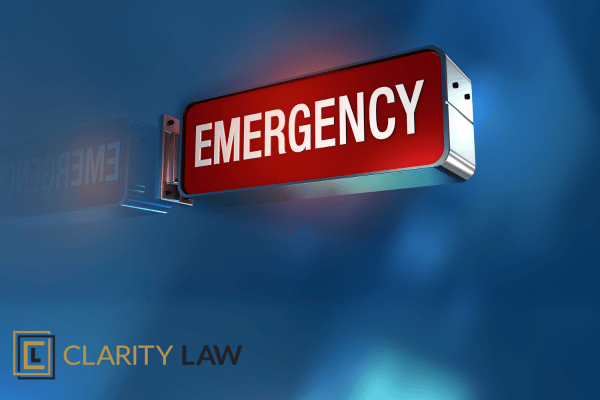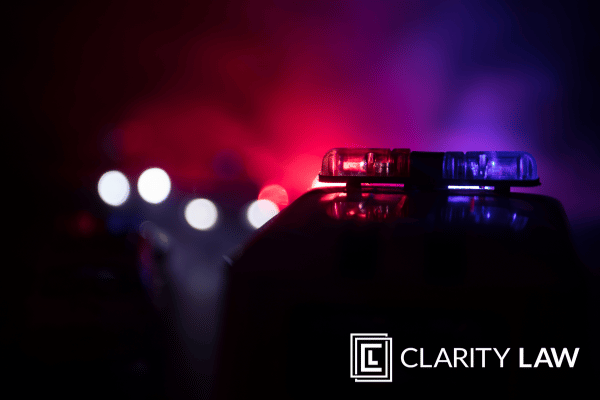
What happens if you believe you are forced to do an illegal act in Queensland due to a sudden emergency arising ? Is there a defence to this extraordinary emergency and what would happen in court if you are charged?
What is the defence of sudden or emergency driving?
Section 25 of the Criminal Code (QLD) provides that;
Extraordinary emergencies
Subject to the express provisions of this Code relating to acts done upon compulsion or provocation or in self-defence, a person is not criminally responsible for an act or omission done or made under such circumstances of sudden or extraordinary emergency that an ordinary person possessing ordinary power of self-control could not reasonably be expected to act otherwise.
The elements of the defence are as follows ;
-
The first element requires consideration as to whether there was circumstances of sudden or extreme emergency. The word emergency carries its ordinary meaning.
-
The second element requires consideration as to whether the defendant’s act or omission was done or made under the circumstances of sudden or extreme emergency. The requirement that the act or omission was “done or made under” such circumstances requires that the defendant acted as the defendant did because of the stress of those circumstances upon the defendant. If the circumstances in the first element were not known to the defendant or if the defendant behaved as the defendant did for reasons unrelated to those circumstances, then it will not have been an act or omission done or made under those circumstances.
-
The third element requires a look at the circumstances of sudden or extreme emergency under which the defendant may have acted. The court must look at were those circumstances such that an ordinary person possessing ordinary powers of self-control could not reasonably be expected to act otherwise? To exclude this element the prosecution must prove beyond reasonable doubt that the defendant’s reaction in the circumstances was outside what you could reasonably expect of an ordinary person with ordinary powers of self-control.
A person in a sudden or extraordinary emergency may make what appears in calm hindsight to be a wrong choice but you must look at the situation as it presented itself in the emergency of the moment. The defendant is not expected to be wiser or better than an ordinary reasonable person in the same circumstances; and you will appreciate that a person in an emergency cannot always weigh up and deliberate about what action is best to take. Such a person must act quickly and do the best the person can.
If the prosecution cannot exclude any of the other elements either, the defence will apply to excuse the defendant from criminal responsibility and therefore the defendant will be found not guilty.
When could the defence apply?
Lets look at the types of offences that the defence of emergency driving might apply to.
Disqualified driving
The leading case in Queensland giving guidance as to the application of section 25 of the Criminal Code for a disqualified driving charge is Moores v Pearce.
The facts of the case were
-
The appellant, Tod Moores, was taking care of a sick 3½-year-old child
-
The child's temperature was elevated, leading to increased irritability
-
The appellant attempted to contact the child's parent and monitored the child's condition
-
The appellant's partner, an enrolled endorsed nurse, arrived later and was too ill to drive
-
The decision to drive for medication was made, leading to interception by police as Mr Moores licence at the time was disqualified
The Magistrate found that the most reasonable options were to seek medical advice by phone or by calling an ambulance, but Mr Moores did not pursue these.
Mr Moore argued that the situation was not yet so dire that an ambulance should be called. He also argued public transport was not available and that he could not afford a taxi.
Mr Moore was found guilty of disqualified driving by the magistrate. He then appealed the decision saying he had a defence of extraordinary emergency.
The appeal court found he did have a defence and should be found not guilty. The appeal judge found that the prosecution led no evidence about what the result would have been at the time if Mr Moore had exercised any of the choices that the magistrate held were reasonably open for him. Importantly, there was no evidence that the advice given would have been be to the effect that it was unnecessary to obtain relevant medication for such a child, such as Panadol. In the absence of relevant contrary evidence, it is not beyond reasonable doubt that the ordinary person possessing ordinary power of self-control in the sudden emergency then being confronted could reasonably be expected to act as if there were no other realistic alternative choices to driving, even for a person disqualified from driving.
This case provides some insight on how the defence of emergency applies to disqualified driving charges in Queensland. In particular the summary in paragraph 16 of the decision that provides
…On appeal, it was held, first, that, relevantly, in order to negative the defence, the tribunal of fact must be satisfied beyond reasonable doubt that, in the circumstances that it found, “the ordinary person could reasonably be expected to act otherwise” (emphasis added): at [17]. This meant that, accordingly, if in such circumstances it was reasonable to expect that an ordinary person with ordinary powers of self-control could have acted as the defendant did, the defence would not have been excluded: also at [17]. Secondly, it was held that the ordinary person means an ordinary person “in the position of the defendant …
Once the defence is raised at a trial it would be up the Prosecution to prove beyond a reasonable doubt that the defence was excluded as was stated at paragraph 24 in Moores v Pearce;
…there is no onus on an defendant to raise a reasonable doubt where s 25 is prospectively engaged since, once an defendant person has satisfied the evidentiary onus, the onus of excluding the operation of the excuse beyond reasonable doubt is on the prosecution: at [23]. Usefully, that judgment contained a reference to a much cited text of R S O’Regan as proposing that s 25 provides a residual defence to protect the “morally innocent” where other defences do not apply…
Another disqualified driving charge was the matter of Berbic v Steger
The facts of the case were that;
-
the defendant had previously had his licence disqualified and could not legally drive
-
the partner of the defendant drove them both to an internet café at Sunnybank Hills in Queensland
-
at about 11.30 pm the partner obtained a meal at a fast food outlet, which she ate back at the internet café, and stayed there with the defendant
-
about an hour later, she became really sick. She felt nausea and started vomiting. She went to a toilet which was outside the café
-
the pain became worse and she was crying and screaming. She phoned her father to come and get her but he was unable to because he was himself not well, then she asked her sister who said she could not be there for an hour
-
she said she was in so much pain she just wanted to go home and she was pleading with the defendant to take her because she just wanted to get out of there. She continually asked him to do it, and he started to drive her home
-
on the way, she had really sharp pains in her stomach and asked him to take her instead to a hospital. Before she reached there, however, she felt as though she was going to throw up again, and asked the appellant to pull into a service station
-
the appellant did so, she got out and went to the toilet where she was sick again
-
the defendant was found by police in the drivers seat and arrested for disqualified driving
The cases provides that an ordinary person, that being an ordinary person in the position of the defendant could have acted as the defendant did. The word “could” is critical.
Dangerous Driving
Section 25 can be a defence to a dangerous driving charge. Cases where the defence of emergency have been successful in dangerous driving cases in Queensland include;
This is one of the more interesting cases where the defence of emergency might exist.
The facts were that;
- the defendant and his two passengers were driving away from the IGA store at Mudgeeraba, where they had committed a break and enter
- the defendant was driving a late model VW Golf (“the VW”), in which were three persons and a safe weighing some 20 kilograms which had been taken from the IGA store
- as the defendant drove along Spencer Road he noticed an odour and asked one of the passenger in the rear seat whether the odour was emanating from the safe
- after making the enquiry about the odour, the defendant felt something heavy hit his shoulder which then slipped onto his lap. He thought that the passenger in the rear had lifted the safe and rested it on the shoulder of the driver’s seat from where it fell onto him
- the defendant then took his eyes off the road and used both arms in an attempt to push the safe back into the rear seat
- the VW collided with the rear of a parked truck
- both passengers in the VW were killed
The defendant was found guilty of dangerous driving causing death at the trial.
He appealed and the appeal judges found that the jury should have had an opportunity to consider whether the defendant was not guilty due to the defence of sudden emergency. A retrial was ordered.

The defendant, while driving late at night along Ipswich Road in Queensland, became aware that another vehicle had come up behind him, and was being driven very close to the rear of his vehicle, and continued to do so both when the defendant reduced his speed to well under the speed limit, and when he increased it to significantly above the speed limit.
He said that he became scared of the other driver’s intentions, and drove at high speed in an attempt to escape. At one point, the other vehicle actually bumped into the rear of his vehicle.
The defendant was found guilty of dangerous driving but appealed the decision. On appeal the court found that the defence of extraordinary emergency was valid. A new trial was ordered. His Honour said:
There is quite a significant body of evidence to the effect that a rather terrifying situation may have been created by the driver of the other vehicle and that the defendant may have been acting in response to it from fear and to avoid the risk of harm at the hands of the other driver.
What would a “sudden” emergency mean?
If there are no circumstances of sudden or extraordinary emergency, then the defence will not apply. The courts in Queensland still haven’t entirely decided how an extraordinary emergency which is not also “sudden” could occur.
The courts have generally assigned a meaning to “emergency” that extends beyond circumstances that are urgent or time imperative. However, the Court has also considered that the concept of a “sudden emergency” may be taken to refer to the manner in which the emergency arose, rather than speaking to the timing of the required response.
Summary
The elements of the defence of sudden or extraordinary emergency in Queensland are;
-
there existed circumstances of sudden or extreme emergency; and
-
the defendant’s act or omission was done or made under those circumstances; and
-
those circumstances were such that an ordinary person possessing ordinary powers of self-control could not reasonably be expected to act otherwise.
If the prosecution cannot exclude beyond reasonable doubt the possibility that these three elements were all present at the time of the alleged offence then the defence will and the defendant will be found not guilty of the offence.
One of the people who drafted the legislation described section 25 as;
This section gives effect to the principle that no man is expected (for the purposes of the criminal law at all events) to be wiser and better than all mankind. It is conceived that it is a rule of the common law, as it undoubtedly is a rule upon which any jury would desire to act. It may, perhaps, be said that it sums up nearly all the common law rules as to excuses for an act which is prima facie criminal.’
Why should I engage Clarity Law?
Quite frankly we care about getting the right outcome for our clients and helping them through one of the most difficult times in their lives.
In the face of a traffic charge, selecting the right legal representation is paramount, and Clarity Law offers a unique blend of proficiency and empathy that sets us apart. Our firm is dedicated to providing clarity in the often complex world of traffic law. We believe that every client deserves a clear understanding of their rights and the legal process they're navigating.
Our experienced team of lawyers approaches each case with a commitment to open communication, ensuring you're informed every step of the way. With a proven track record of securing favourable outcomes, we have the expertise to navigate even the most intricate legal challenges.
At Clarity Law, we strive not only to be your staunch advocates but also to provide a supportive, understanding environment during this trying time. Choosing Clarity Law means choosing a team that will tirelessly work to protect your rights and pursue the best possible outcome for your case.
You can read more about our founder, Steven Brough’s, journey to starting Clarity Law by clicking here.

How do I get more information or engage you to act for me?
If you want to engage us or just need further information or advice then you can either;
-
Use our contact form and we will contact you by email or phone at a time that suits you
-
Call us on 1300 952 255 seven days a week, 7am to 7pm
-
Click here to select a time for us to have a free 15 minute telephone conference with you
-
Email This email address is being protected from spambots. You need JavaScript enabled to view it.
-
Send us a message on Facebook Messenger
-
Click the help button at the bottom right and leave us a message
We are a no pressure Queensland law firm, we are happy to provide free initial information to assist you. If you want to engage us then great, we will give you a fixed price for our services so you will know with certainty what we will cost. All the money goes into a trust account monitored by the Queensland Law Society and cannot be taken out without your permission.
If you don’t engage us that fine too, at least you will have more information on the charge and its consequences.
Need more information?
We have a range of articles on our traffic law blog. Some of the most recent have included:
-
Case Study - High Range Drink Driving and Disqualified Driving
-
Going through a drink driving charge in Brisbane Magistrate Court
-
Navigating Drink Driving Charges in Queensland: Top 5 Do's and Don'ts
-
Disqualification vs Suspension, what is the difference in Queensland?
-
How does a traffic matter proceed in the Southport Magistrates Court?
-
Will I get a criminal conviction for a drink driving charge?
What our clients say about us





